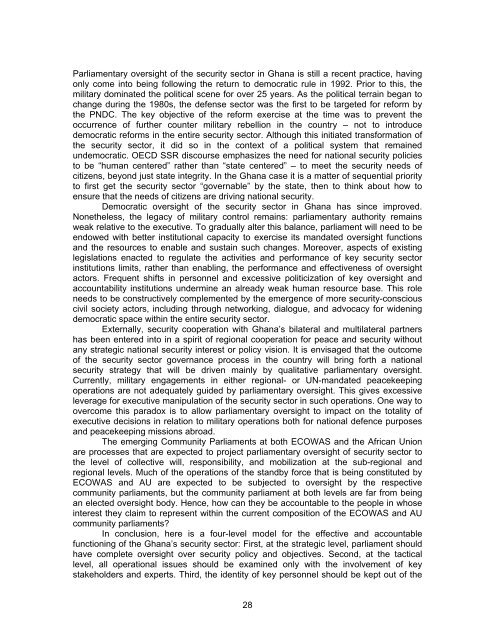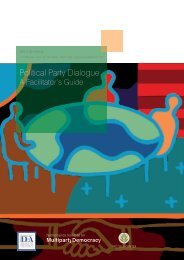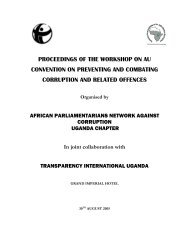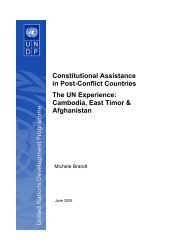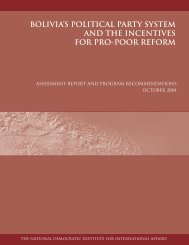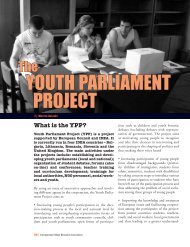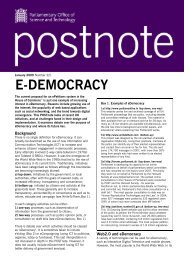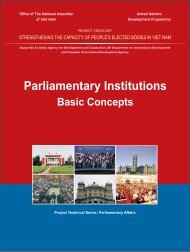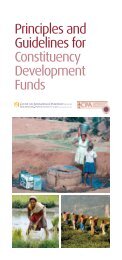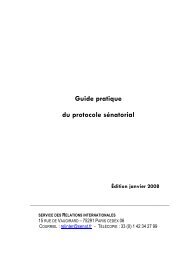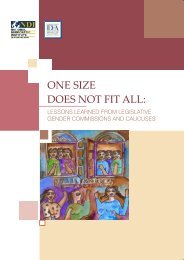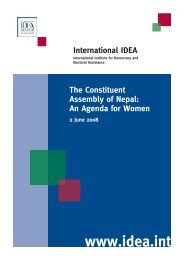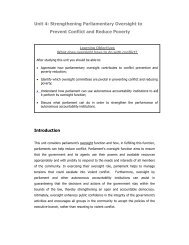Parliamentary Oversight of the Security Sector: Lessons from Ghana
Parliamentary Oversight of the Security Sector: Lessons from Ghana
Parliamentary Oversight of the Security Sector: Lessons from Ghana
You also want an ePaper? Increase the reach of your titles
YUMPU automatically turns print PDFs into web optimized ePapers that Google loves.
<strong>Parliamentary</strong> oversight <strong>of</strong> <strong>the</strong> security sector in <strong>Ghana</strong> is still a recent practice, havingonly come into being following <strong>the</strong> return to democratic rule in 1992. Prior to this, <strong>the</strong>military dominated <strong>the</strong> political scene for over 25 years. As <strong>the</strong> political terrain began tochange during <strong>the</strong> 1980s, <strong>the</strong> defense sector was <strong>the</strong> first to be targeted for reform by<strong>the</strong> PNDC. The key objective <strong>of</strong> <strong>the</strong> reform exercise at <strong>the</strong> time was to prevent <strong>the</strong>occurrence <strong>of</strong> fur<strong>the</strong>r counter military rebellion in <strong>the</strong> country – not to introducedemocratic reforms in <strong>the</strong> entire security sector. Although this initiated transformation <strong>of</strong><strong>the</strong> security sector, it did so in <strong>the</strong> context <strong>of</strong> a political system that remainedundemocratic. OECD SSR discourse emphasizes <strong>the</strong> need for national security policiesto be “human centered” ra<strong>the</strong>r than “state centered” – to meet <strong>the</strong> security needs <strong>of</strong>citizens, beyond just state integrity. In <strong>the</strong> <strong>Ghana</strong> case it is a matter <strong>of</strong> sequential priorityto first get <strong>the</strong> security sector “governable” by <strong>the</strong> state, <strong>the</strong>n to think about how toensure that <strong>the</strong> needs <strong>of</strong> citizens are driving national security.Democratic oversight <strong>of</strong> <strong>the</strong> security sector in <strong>Ghana</strong> has since improved.None<strong>the</strong>less, <strong>the</strong> legacy <strong>of</strong> military control remains: parliamentary authority remainsweak relative to <strong>the</strong> executive. To gradually alter this balance, parliament will need to beendowed with better institutional capacity to exercise its mandated oversight functionsand <strong>the</strong> resources to enable and sustain such changes. Moreover, aspects <strong>of</strong> existinglegislations enacted to regulate <strong>the</strong> activities and performance <strong>of</strong> key security sectorinstitutions limits, ra<strong>the</strong>r than enabling, <strong>the</strong> performance and effectiveness <strong>of</strong> oversightactors. Frequent shifts in personnel and excessive politicization <strong>of</strong> key oversight andaccountability institutions undermine an already weak human resource base. This roleneeds to be constructively complemented by <strong>the</strong> emergence <strong>of</strong> more security-consciouscivil society actors, including through networking, dialogue, and advocacy for wideningdemocratic space within <strong>the</strong> entire security sector.Externally, security cooperation with <strong>Ghana</strong>’s bilateral and multilateral partnershas been entered into in a spirit <strong>of</strong> regional cooperation for peace and security withoutany strategic national security interest or policy vision. It is envisaged that <strong>the</strong> outcome<strong>of</strong> <strong>the</strong> security sector governance process in <strong>the</strong> country will bring forth a nationalsecurity strategy that will be driven mainly by qualitative parliamentary oversight.Currently, military engagements in ei<strong>the</strong>r regional- or UN-mandated peacekeepingoperations are not adequately guided by parliamentary oversight. This gives excessiveleverage for executive manipulation <strong>of</strong> <strong>the</strong> security sector in such operations. One way toovercome this paradox is to allow parliamentary oversight to impact on <strong>the</strong> totality <strong>of</strong>executive decisions in relation to military operations both for national defence purposesand peacekeeping missions abroad.The emerging Community Parliaments at both ECOWAS and <strong>the</strong> African Unionare processes that are expected to project parliamentary oversight <strong>of</strong> security sector to<strong>the</strong> level <strong>of</strong> collective will, responsibility, and mobilization at <strong>the</strong> sub-regional andregional levels. Much <strong>of</strong> <strong>the</strong> operations <strong>of</strong> <strong>the</strong> standby force that is being constituted byECOWAS and AU are expected to be subjected to oversight by <strong>the</strong> respectivecommunity parliaments, but <strong>the</strong> community parliament at both levels are far <strong>from</strong> beingan elected oversight body. Hence, how can <strong>the</strong>y be accountable to <strong>the</strong> people in whoseinterest <strong>the</strong>y claim to represent within <strong>the</strong> current composition <strong>of</strong> <strong>the</strong> ECOWAS and AUcommunity parliaments?In conclusion, here is a four-level model for <strong>the</strong> effective and accountablefunctioning <strong>of</strong> <strong>the</strong> <strong>Ghana</strong>’s security sector: First, at <strong>the</strong> strategic level, parliament shouldhave complete oversight over security policy and objectives. Second, at <strong>the</strong> tacticallevel, all operational issues should be examined only with <strong>the</strong> involvement <strong>of</strong> keystakeholders and experts. Third, <strong>the</strong> identity <strong>of</strong> key personnel should be kept out <strong>of</strong> <strong>the</strong>28


